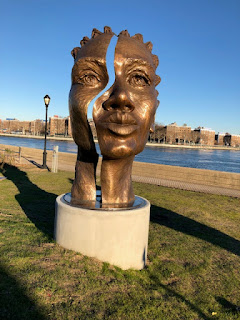There is nothing so demonstrably false that, if repeated often enough, large numbers of people will take as fact.
This is especially true today, with social media as such a powerful tool for amplifying misinformation or outright lies. (I know, you're reading this over social media. What can I say?) If the election of Donald Trump--and the notion that he had re-election "stolen" from him--hasn't taught us as much, I don't know what will.
One problem, I think, is that people who are in a position to question such stories---a polite way of saying "folks who ought to have well-tuned bullshit detectors"--accept, wittingly or not, misinformation at face value. They don't question the sources of such stories, let alone how anyone came to the conclusions that are spread as lies or disinformation.
A recent example came in the form of a questionable study that morphed into an urban legend via the British media. To be fair, such a scenario could have--and probably has--played out in other countries and cities. It's one thing when the Daily Mail (which, as best as I can tell, seems like England's equivalent of the New York Post) spreads, as we would say in the academic argot, narratives with a tenuous relationship with verities. It's another when outlets as august as the BBC spread such nonsense. The Daily Mail's headline proclaimed, "Cycle lanes installed at start of COVID pandemic help make London most congested city in the world." BBC London made it sound more reasonable, or simply toned it down: "Cycle lanes blamed as city named most congested."
The story could have gotten even more traction had Peter Walker, a reporter on transportation and environmental issues for the Guardian, spoken about it on a national radio program. At least, more people would have taken the narrative as an article of faith if he’d spoken about it as the program’s producers might have expected.
He had been contacted to do that, he says. As he checked the story, the program's producers decided to bring on somebody else. From what Walker says, I can't help but to wonder whether the person they chose parroted the lines from the Daily Mail and BBC London items.
Turns out, the business about London being the most congested city came from a report called the "Global Traffic Scorecard." Its title makes it seem plausible enough--until you realize that it was issued by a company called Inrix, which sells traffic data.
 |
| Photo by Dominika Zarzycka, from the Guardian |
Now, I haven't been to London in a long time, so I can't offer even anecdotal evidence to confirm or refute the report's conclusion. For all I know, London might be more congested than Paris or Athens, two large cities in which I've cycled during the past couple of years. And it may well be more choked with traffic than cities like Luang Prbang or Siem Reap, which I've also recently ridden.
One problem is that whoever compiled the Inrix report couldn't tell us whether the British capital is more congested than any Asian, African or Latin American city because no such places were included in the study.
Another is that their determination of London as the most congested city is based on--again I'll revert to academic argot--flawed methodology. It seems to be based on the premise that traffic is like water: its flow is determined by the width of the pipe, or road. Decades of research have refuted this idea (commonly called "induced demand" or, for laypeople, "build it and they will come") about traffic, but it seems to be a foundation for the report--and an Inrix employee who embellished and amplified it.
Peter Lees' official Inrix title is "Director of Operations--Media." In other words, he's a publicist (which, I blush to admit, I was for a (thankfully) brief time). Such people tend not to be "traffic wonks," Walker says, or a wonks of any kind. Now whether Lees is a bald-faced liar, or simply someone who doesn't actually read the stuff he represents to the media, I won't say. I will, however mention this: He linked London's congestion to bike lanes--which are not mentioned anywhere in the 21-page report.
Now, I have all sorts of issues with bike lanes, at least as they exist in too many places. I've ridden too many, especially here in New York, that are poorly conceived, designed, constructed and maintained. They don't provide practical or safe routes for transportation cycling: Few link to other bike (or bikeable) routes or to places where significant numbers or would-be cycle commuters study, work or shop. But any traffic congestion--including that of Crescent Street in Astoria, where I live--existed before bike lanes were built.
Misinformation, whether or not it's intended as such, can cause people to believe things that are demonstrably false and act in irrational ways, especially when it's amplified by folks with actual or metaphorical microphones. So, in that sense, what leads folks to think that bike lanes cause traffic congestion is basically the same as what causes them to believe their candidate had an election "stolen" from him.










